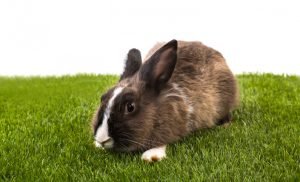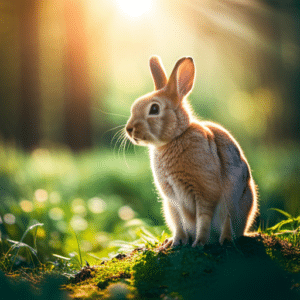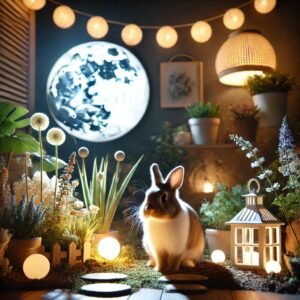Ever wondered what your rabbit is trying to tell you with those unique rabbit sounds? Understanding the language of rabbits can strengthen the bond between you and your furry friend, as well as help you identify potential health issues or behavioral concerns. In this blog post, we’ll explore the fascinating world of rabbit sounds and their meanings. So, hop in, and let’s start deciphering the secret language of rabbits!
Key Takeaways
Rabbit noises like purring, clucking, and humming indicate contentment while honking, grunting, and thumping show communication.
Defensive sounds such as growling, hissing, and snorting signal danger or irritation.
Health-related issues may be indicated by teeth grinding, wheezing/screaming & sneezing/hiccups/coughing – so pay attention to your rabbit’s body language!
Rabbit Sounds of Contentment

Just like humans, rabbits express contentment through various sounds and body language. Purring, clucking, and humming are some of the most common noises you’ll hear from a happy rabbit.
We will now delve into these delightful rabbit noises in more detail.
Purring

Purring is a soft noise made by rabbits when they’re feeling happy and relaxed, similar to a cat’s purr. You may notice their head vibrating and whiskers twitching as they grind their teeth in contentment.
However, it can be tricky to tell the difference between purring and teeth grinding, as both can indicate pain in rabbits. So, make sure to look for other signs of contentment, such as a relaxed posture or gentle eye movement.
Clucking
Clucking is another quiet, contented sound made by rabbits. It resembles a soft hiccup or a squeak caught in their throat, often heard while they’re enjoying their favorite meals or taking a nap. This rabbit clucking sound is a sign of a happy and relaxed bunny.
Grasping these sounds as a rabbit owner can aid in providing superior care for your pet, ensuring their happiness and comfort.
Hence, should you catch your rabbit humming, they are probably in high spirits and eager for amusement.
Rabbit Communication Noises

Rabbits use different noises to communicate with each other and their owners. Honking, grunting, and thumping are some of the most common rabbit noises you might encounter.
Comprehending these sounds enables a more effective response to your rabbit’s needs and emotional states.
Honking
Honking is a soft sound made by rabbits when they are excited or seeking attention, often heard during playtime or feeding. If you listen closely, you might hear your rabbit honking when expecting treats or when they’re excited for playtime.
This charming very soft sound undoubtedly indicates that your pet is brimming with joy and excitement!
Grunting
Grunting can be a sign of happiness or annoyance in rabbits, depending on the context and accompanying body language. A rabbit’s grunt may sound similar to a honk, but it can also signal irritation or a desire to mate, especially in unneutered males.
Hence, closely observe your rabbit’s actions to accurately decipher their grunting.
Thumping
Thumping is a loud noise made by rabbits when they sense danger or want attention. It’s created by slamming their back legs against the ground, and it serves as an instinctual behavior to alert their home of potential danger.
Should you detect your rabbit thumping, promptly evaluate their surroundings for potential threats or sources of stress.
Defensive Rabbit Sounds

When rabbits feel threatened or irritated, they may produce defensive sounds such as growling, hissing, and snorting. These noises serve as warnings of potential threats and can help you understand when your rabbit is feeling uneasy or needs some space.
Awareness of these indications and providing your rabbit with needed space is crucial.
Growling
Growling is an aggressive noise made by rabbits when they feel threatened, often accompanied by lunging or biting. Should you detect your rabbit growling, cautiously approach them and attempt to discern the root of their unease, as understanding rabbit growls can help you address the issue.
Make yourself appear smaller and move slowly to avoid exacerbating the situation.
Hissing
Hissing is a rare sound made by rabbits to scare away potential threats or express aggression. This noise, known as rabbit hisses, indicates that your rabbit feels cornered or threatened and may resort to defensive behavior.
Should your rabbit be heard hissing, it is advisable to allow them some room to soothe themselves and evaluate the circumstances.
Grasping their needs and feelings enables superior care for your pet, ensuring their well-being.
Rabbit Distress Signals

Rabbits emit distress signals, such as teeth grinding, wheezing, and screaming, to indicate fear, pain, or health issues. Recognizing these sounds and their meanings can help you act quickly to address any concerns and provide the proper care and support for your rabbit.
Recognizing the signs of distress can help maintain your rabbit’s health and happiness. Knowing
Teeth Grinding
Teeth grinding is a sign of pain or discomfort in rabbits, often accompanied by other symptoms like decreased appetite or low energy levels. Should you observe your rabbit grinding its teeth, it is crucial to evaluate their general health and seek veterinary advice if required.
Dental issues are a common cause of teeth grinding, so regular check-ups can help prevent and detect problems early on.
Wheezing
Wheezing is a serious respiratory issue in rabbits, which requires immediate veterinary attention. This sound can indicate a respiratory infection or a blockage in the nose.
Should your rabbit be observed wheezing, promptly contact your vet to secure appropriate care and treatment.
Screaming
Screaming is a loud, distressing sound made by rabbits when they are in extreme pain or danger, signaling the need for immediate help. This high-pitched and intense rabbit scream can be quite alarming, but it’s essential to act quickly and provide assistance to your rabbit if they are screaming.
In such cases, consult with a veterinarian as soon as possible.
Rabbit Sleep Sounds

Rabbits make various sounds while sleeping, such as snoring and sleep-talking. These noises are perfectly normal and can provide insight into your rabbit’s sleep patterns and overall well-being.
Monitoring your rabbit’s sleep sounds can provide a deeper insight into their sleep patterns.
Snoring
Snoring is a normal sound made by rabbits during sleep, often characterized by a soft, squeaky noise. While occasional snoring is typically harmless, loud snoring accompanied by other symptoms such as nasal discharge or sneezing may indicate a respiratory infection and require a vet check-up.
Monitoring your rabbit’s snoring and other symptoms is crucial for safeguarding their health.
Sleep Talking
Sleep talking is a soft mumbling or squeaking sound made by rabbits while they are asleep or yawning. This adorable noise is normal and can be heard occasionally as your rabbit dreams or relaxes during their sleep.
Rabbit Health-Related Sounds

Rabbits make health-related sounds, such as sneezing, hiccups, and coughing, which can indicate potential issues. Being a responsible rabbit owner necessitates awareness of these sounds and diligent health monitoring of your pet to ensure their well-being.
Sneezing
Sneezing in rabbits can be caused by various factors, such as allergies, dust, or even a respiratory infection. Occasional sneezing is not uncommon; however, frequent sneezing accompanied by other symptoms like nasal discharge or runny eyes may indicate a respiratory infection and require a veterinarian’s attention.
Hiccups
Hiccups are small, repeated squeaks in rabbits that usually last for a short period. While occasional hiccups are normal, frequent or prolonged hiccups may indicate an underlying health issue and require a vet check-up.
Monitoring your rabbit’s hiccups and seeking veterinary attention if needed is crucial.
Coughing
Coughing in rabbits can be a sign of respiratory issues or irritation. Should you observe your rabbit coughing, it is crucial to keep tabs on their overall health and any additional symptoms.
If needed, consult with a veterinarian to ensure proper care and treatment.
Tips for Understanding Rabbit Sounds

Comprehending rabbit sounds and what they signify can fortify the bond between owners and their pets, while also helping to identify potential health or behavioral issues. By listening carefully to your rabbit’s noises and observing their body language, you can gain a deeper understanding of their emotions and needs, ensuring a happy and healthy relationship with your furry friend.
Rabbits, also known for their bunny sounds, are capable of making a variety of common rabbit sounds, from purring and chirping to growling and thumping, just like other rabbits. The unique combination of sounds a rabbit makes, including the rare occurrence of a rabbit screaming, sets them apart from their peers.
Summary
In conclusion, rabbits have a rich vocabulary of sounds that can help us understand their emotions, needs, and well-being. By familiarizing ourselves with these unique noises, we can strengthen the bond with our pets, provide better care, and ensure their happiness. So, listen closely, and let’s speak the language of rabbits to create a harmonious and loving relationship with our furry friends!
Frequently Asked Questions
What sound do bunnies make when they are happy?
Rabbits make a soft and low-pitched noise known as a ‘cluck’ when they are happy. This sound is similar to a chirrup, and you may hear it when your rabbit is eating something particularly tasty. Rabbits can also purr like cats, as well as make other contented noises such as sighing or teeth grinding.
What are the grunting noises rabbits make?
Rabbits make grunting noises that are associated with frustration and discomfort and can be accompanied by kicking, scratching, or biting. This is different from the honking sound which generally indicates a more positive emotion.
What sound attracts rabbits?
Rabbits are attracted to the sound of food being eaten, as it may remind them of their own mealtime. They also respond to the clicking sound of a pen or a general clicker.
Is it a rabbit squeak?
Yes, rabbits can make a shrill squeaking sound to express happiness or frustration. They also make other noises such as growling, snorting, hissing, whimpering, thumping, and screaming.
What does purring indicate in rabbits?
Purring in rabbits indicates contentment and relaxation, just like a cat’s purr. It usually comes with other signs of pleasure, making it easy to tell if your rabbit is happy. Rabbits purr when they are content and relaxed, and it is often accompanied by other signs of pleasure. This makes it easy to tell if your rabbit is happy.



